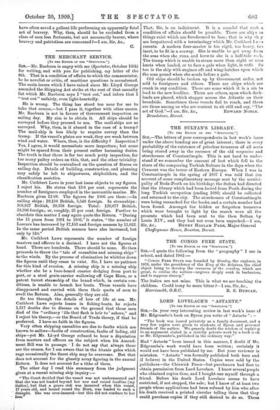THE MERCHANT SERVICE.
LTO TER EDITOR OF THE "SPECTATOR.".1 Raeburn is angry with me (Spectator, October 16th) for writing, and with you for publishing, my letter of the 9th. That is a condition of affairs to which the commentator,
be he novelist or critic, of maritime questions is accustomed. The main issues which I have raised since Mr. Lloyd George amended the Shipping Act strike at the root of that casualty list which Mr. Raeburn says I "trot out," and infers that I "trot out" unfairly, even light-heartedly.
He is wrong. The thing has stood too near for me to take that course,—but I pass it, together with other sneers. Mr. Raeburn is not in favour of Government inspection on sailing day. My aim is to obtain it. All ships should be surveyed before they proceed to sea. The mail-ships are so surveyed. Why, then, is it absurd in the case of a tramp P The mail-ship is less likely to require survey than the tramp. If the vessel's plates are weak, they are weak between wind and water. Where, then, is the difficulty ? Inspection?
Yes, I agree, it would necessitate more inspectors; but some might be spared from their present rather harassing duties. The truth is that there is far too much petty inspection, far too many paltry orders on this, that, and the other triviality.
Inspection should be centralised on the question of fitness on sailing day. Details of building, construction, and planning may safely be left to shipowners, shipbuilders, and the classification societies.
Mr. Cuthbert Laws in your last issue objects to my figures.
I reject his. He states that 13.6 per cent, represents the number of foreigners employed in the mercantile marine. Mr.
Raeburn gives 1208. The figures for 1906 are these :—In sailing ships : 19,150 British, 5,548 foreign. In steamships : 108,927 British, 29,358 foreign. Total: 128,077 British, 34,906 foreign; or, roughly, 25 per cent, foreign. Further to elucidate this matter I may again quote the Return. "During the 15 years from 1891 to 1906," it states, "the number of Lascars has increased by 17,103 and foreign seamen by 11,022.
In the same period British seamen have also increased, but only by 510."
Mr. Cuthbert Laws represents the number of foreign masters and officers in a decimal. I have not the figures at hand. There are hundreds. There should be none. He then
proceeds to throw the "tale of casualties and missing ships" to the winds. By the process of elimination he whittles down the figures until they cease to exist. Sir, I have no patience for this kind of evasion. A missing ship is a missing ship whether she be a bare-boned coaster dodging from port to port, or a steel grain-carrier wallowing off Cape Horn, or a patent turret steamship of the brand which, in certain con- ditions, is unable to launch her boats. These vessels have disappeared and carried with them their quota of men to -swell the Return. Also, generally they are old.
So too through the details of loss of life at sea. Mr. Cuthbert Laws rejects losses in fishing-boats, he rejects 1,317 deaths due to disease on the ground that these men died of the "ordinary ills that flesh is heir to' ashore," and I reject his theory,—or the Board of Trade theory, if that be preferred. I have no faith in the figures.
Very often shipping casualties are due to faults which are known to sailors—faults of construction, faults of lading, old ships—yet Mr. Lloyd George refused to hear a deputation from masters and officers on the subject when his Amend- ment Bill was in passage. ' I do not say that always these are the causes, for I am aware that in the titanic gales which rage occasionally the finest ship may be overcome. But that does not account for the ghastly array figuring in the annual Return. It does not account for a tithe of them.
The other day I read this summary from the judgment given at a recent missing ship inquiry :—
"The Court decided that the vessel was not undermanned and that she was not loaded beyond her new and raised loadtine [my italics], but that a grave risk was incurred when this vessel, 17 years old, and bound round the Horn, was loaded to such a draught. She was over-insured—but this did not conduce to her loss." That, Sir, is an indictment. It is a scandal that such a condition of affairs should be possible. There are shirs as things exist which are foredoomed to loss ; that is why ih .y are bespattered with a terminology 'which Mr. Cuthbert Laws resents. A modern four-master is too rigid, too heavy, to) inert, to be fit in a seaway. She is unable to get away from the seas when she runs, and hove-to she is a half-tide rodc. The tramp which is unable to steam more than eight or nine knots when loaded, or to face a gale when light, is unfit. So too is the ship with engines aft and wing-hatches upon which the seas pound when she scuds before a gale.
Old ships should be broken up by Government. order, not sold to foreigners and others. There are ships which are crank in any condition. There are some which it is a sin to load to the new loadline. There are others, upon which deck- loads are placed, which stagger across the Atlantic on their broadside. Sometimes these vessels fail to reach, and there are those among us who are content to sit still and say, "Tin'










































 Previous page
Previous page